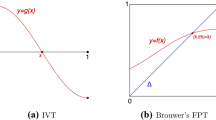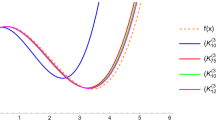Abstract
We offer a new proof of Furstenberg and Katznelson’s density version of the Hales–Jewett Theorem:
Theorem For any δ>0 there is some N 0≥1 such that whenever A⊆[k]N with N≥N 0 and |A|≥δk N, A contains a combinatorial line, that is, for some I⊆[N] nonempty and w 0∈[k][N]∖I we have
Following Furstenberg and Katznelson, we first show that this result is equivalent to a ‘multiple recurrence’ assertion for a class of probability measures enjoying a certain kind of stationarity. However, we then give a quite different proof of this latter assertion through a reduction to an infinitary removal lemma in the spirit of Tao (J. Anal. Math. 103, 1–45, 2007) (and also its recent re-interpretation in (J. Anal. Math., to appear)). This reduction is based on a structural analysis of these stationary laws closely analogous to the classical representation theorems for various partially exchangeable stochastic processes in the sense of Hoover (Relations on probability spaces and arrays of random variables, 1979), Aldous (in Exchangeability in Probability and Statistics, 165–170, 1982; Lecture Notes in Math. 1117, 1–198, 1985) and Kallenberg (J. Theor. Probab. 5(4), 727–765, 1992). However, the underlying combinatorial arguments used to prove this theorem are rather different from those required to work with exchangeable arrays, and involve crucially an observation that arose during ongoing work by a collaborative team of authors (http://gowers.wordpress.com/) to give a purely finitary proof of the above theorem.
Similar content being viewed by others
References
Aldous, D.J.: On exchangeability and conditional independence. In: Exchangeability in Probability and Statistics, Rome, 1981, pp. 165–170. North-Holland, Amsterdam (1982)
Aldous, D.J.: Exchangeability and related topics. In: École d’été de probabilités de Saint-Flour, XIII—1983. Lecture Notes in Math., vol. 1117, pp. 1–198. Springer, Berlin (1985)
Austin, T.: On exchangeable random variables and the statistics of large graphs and hypergraphs. Probab. Surv. 5, 80–145 (2008)
Austin, T.: Deducing the multidimensional Szemerédi Theorem from an infinitary removal lemma. J. Anal. Math. 111, 131–150 (2010)
Austin, T.: Pleasant extensions retaining algebraic structure, I and II. Preprints, available online at arxiv:0905.0518 [verb.org] and 0910.0907 [verb.org]
Austin, T.: On the norm convergence of nonconventional ergodic averages. Ergod. Theory Dyn. Syst. 30(2), 321–338 (2010)
Bergelson, V.: Ergodic Ramsey theory—an update. In: Pollicott, M., Schmidt, K. (eds.) Ergodic Theory of ℤd-Actions: Proceedings of the Warwick Symposium 1993-4, pp. 1–61. Cambridge University Press, Cambridge (1996)
Carlson, T.J., Simpson, S.G.: A dual form of Ramsey’s theorem. Adv. Math. 53(3), 265–290 (1984)
Furstenberg, H.: Ergodic behaviour of diagonal measures and a theorem of Szemerédi on arithmetic progressions. J. Anal. Math. 31, 204–256 (1977)
Furstenberg, H.: Recurrence in Ergodic Theory and Combinatorial Number Theory. Princeton University Press, Princeton (1981)
Furstenberg, H., Katznelson, Y.: An ergodic Szemerédi theorem for commuting transformations. J. Anal. Math. 34, 275–291 (1978)
Furstenberg, H., Katznelson, Y.: An ergodic Szemerédi theorem for IP-systems and combinatorial theory. J. Anal. Math. 45, 117–168 (1985)
Furstenberg, H., Katznelson, Y.: Idempotents in compact semigroups and Ramsey theory. Isr. J. Math. 68(3), 257–270 (1989)
Furstenberg, H., Katznelson, Y.: A density version of the Hales–Jewett theorem. J. Anal. Math. 57, 64–119 (1991)
Glasner, E.: Ergodic Theory via Joinings. American Mathematical Society, Providence (2003)
Gowers, W.T.: Quasirandomness, counting and regularity for 3-uniform hypergraphs. Comb. Probab. Comput. 15(1–2), 143–184 (2006)
Graham, R.L., Rothschild, B.L., Spencer, J.H.: Ramsey Theory. Wiley, New York (1990)
Hoover, D.N.: Relations on probability spaces and arrays of random variables (1979)
Kallenberg, O.: Symmetries on random arrays and set-indexed processes. J. Theor. Probab. 5(4), 727–765 (1992)
Kallenberg, O.: Probabilistic Symmetries and Invariance Principles. Probability and Its Applications. Springer, New York (2005)
Nagle, B., Rödl, V., Schacht, M.: The counting lemma for regular k-uniform hypergraphs. Random Struct. Algorithms 28(2), 113–179 (2006)
Polymath1: A combinatorial approach to Density Hales–Jewett. Online project, viewable at http://gowers.wordpress.com/ (2009)
Szemerédi, E.: On sets of integers containing no k elements in arithmetic progression. Acta Arith. 27, 199–245 (1975)
Tao, T.: A correspondence principle between (hyper)graph theory and probability theory, and the (hyper)graph removal lemma. J. Anal. Math. 103, 1–45 (2007)
Author information
Authors and Affiliations
Corresponding author
Rights and permissions
About this article
Cite this article
Austin, T. Deducing the Density Hales–Jewett Theorem from an Infinitary Removal Lemma. J Theor Probab 24, 615–633 (2011). https://doi.org/10.1007/s10959-011-0373-4
Received:
Revised:
Published:
Issue Date:
DOI: https://doi.org/10.1007/s10959-011-0373-4




